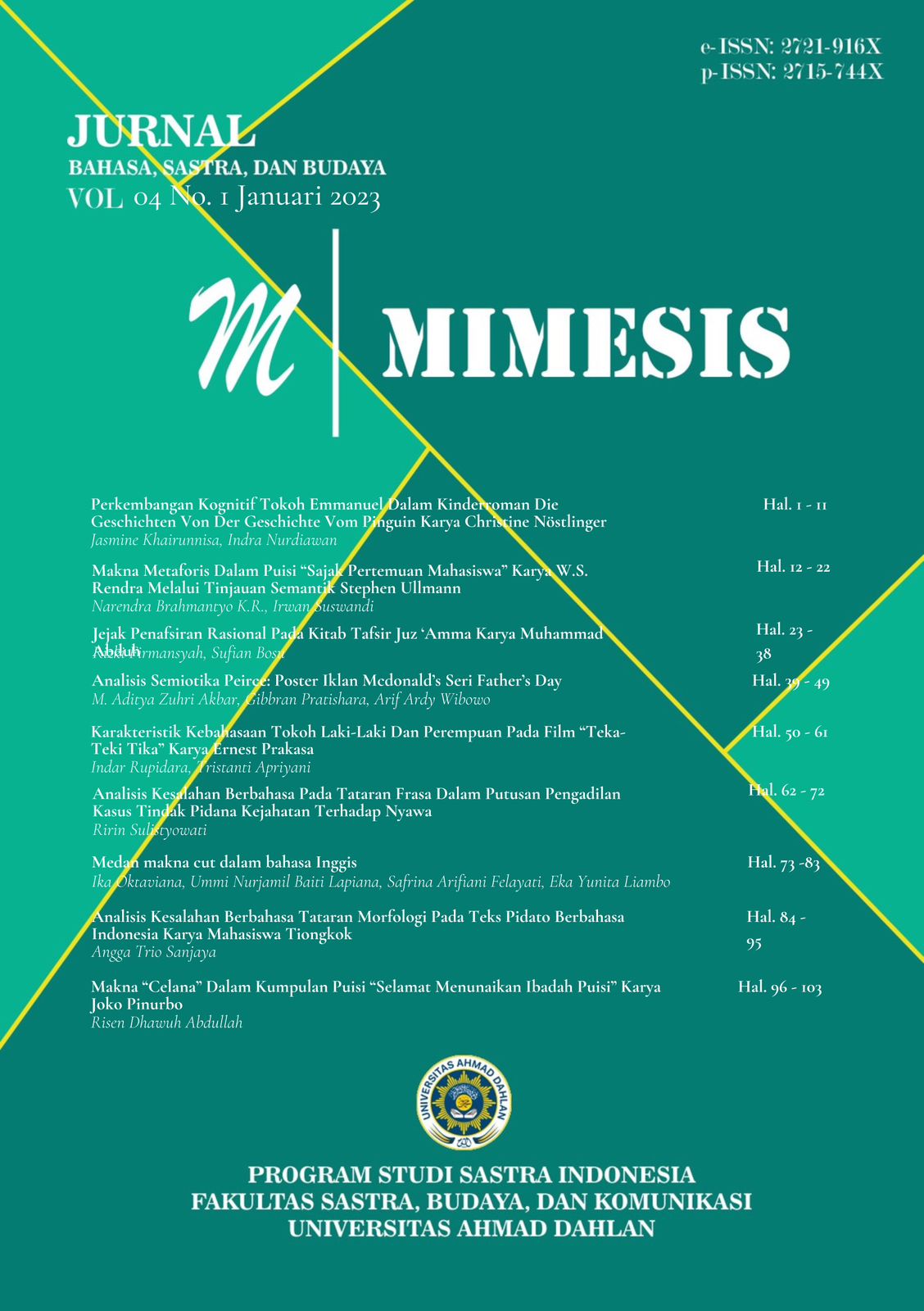PERKEMBANGAN KOGNITIF TOKOH EMMANUEL DALAM KINDERROMAN DIE GESCHICHTEN VON DER GESCHICHTE VOM PINGUIN KARYA CHRISTINE NÖSTLINGER
DOI:
https://doi.org/10.12928/mms.v4i1.6962Keywords:
Cognitive development, Child romance , Character , VygotskyAbstract
This study aims to examine the level of cognitive development and elaborate the factors that influence the level of cognitive development of the figure of Emanuel in the romance Die Geschichten von der Geschichte vom Pinguin by Christine Nöstlinger using Vygotsky's theory of the level of cognitive development. This research is a type of qualitative descriptive research that uses a literary psychology approach. Meanwhile, the instrument in this study is the researcher himself (human instruman). Data collection techniques are carried out by the literature study method and the validity of the data is carried out by validity tests and reliability tests. The results showed that there were two stages of cognitive development experienced by Emanuel's character in Kinderroman Die Geschichten von der Geschichte vom Pinguin, namely the actual developmental stage and the potential developmental stage. The actual stage of development is shown by the way Emanuel's character solves his problems independently, namely being able to deal with penguins independently and find solutions to each problem he faces. The potential stage of development is shown in the way Emanuel's character solves problems with the guidance of adults, namely the characters Emma and Malwine. Meanwhile, the factors that influence the level of cognitive development of Emanuel's character found in the romance Die Geschichten von der Geschichte vom Pinguin are family atmosphere factors, family economic conditions factors and social environment factors.References
Amseke, F. V., Wulandari, W. R., Nasution, L. R., Sari, R. S., Reswari, A., Purnamasari, R., Khaidir, Diarfah, A. D., & Tafonao, I. (2021). Teori dan aplikasi; psikologi perkembangan (H. Marlina, Ed.; Pertama). Yayasan Penerbit Muhammad Zaini.
Farahiba, A. S. (2017). Eksistensi sastra anak dalam pembentukan karakter pada tingkat pendidikan dasar. Waskita, 1(1), 47.
Grasberger, T. (2004). Deutsche Literatur. Löwe Verlag Gmbh.
Hidayah. (2019). Muatan nilai-nilai karakter pada sastra anak berjenis dongeng modern. Alfabeta, 2(2), 8–20.
Marquaß, R. (1997). Erzählende prosatexte analysieren. Duden Verlag.
MÖnks, F. J., Knoers, A. M. P., & Haditono, S. R. (2001). Psikologi perkembangan; pengantar dalam berbagai bagiannya. In Psikologi perkembangan, pengantar dalam berbagai bagiannya. Universitas Gadjah Mada Press.
Mulyadi, S., Weliangan, H., Andriani, I., & Puspitawati, I. (2015). Psikologi perkembangan. Gunadarma.
Neis, E. (1981). Erläuterung zu Goethes Faust. In Bange. Bange.
Nöstlinger, C. (1978). Die Geschichten von der Geschichte vom Pinguin. Beltz Verlag.
Nurgiyantoro, B. (2010). Sastra anak dan pembentukan karakter. Jurnal Cakrawala Pendidikan, 1(3), 25–40. https://doi.org/10.21831/cp.v1i3.232
Nurgiyantoro, B. (2018). Sastra anak: pengantar pemahaman dunia anak. UGM Press.
Slavin, R. E. (2018). Educational psychology : theory and practice. John Hopskin University.
Downloads
Published
Issue
Section
License
Copyright (c) 2023 Jasmine Khairunnisa, Indra Nurdiawan

This work is licensed under a Creative Commons Attribution-ShareAlike 4.0 International License.
License and Copyright Agreement
In submitting the manuscript to the journal, the authors certify that:
- They are authorized by their co-authors to enter into these arrangements.
- The work described has not been formally published before, except in the form of an abstract or as part of a published lecture, review, thesis, or overlay journal.
- That it is not under consideration for publication elsewhere,
- That its publication has been approved by all the author(s) and by the responsible authorities tacitly or explicitly of the institutes where the work has been carried out.
- They secure the right to reproduce any material that has already been published or copyrighted elsewhere.
- They agree to the following license and copyright agreement.
Copyright
Authors who publish with Mimesis agree to the following terms:
- Authors retain copyright and grant the journal right of first publication with the work simultaneously licensed under a Creative Commons Attribution License (CC BY-SA 4.0) that allows others to share the work with an acknowledgment of the work's authorship and initial publication in this journal.
- Authors are able to enter into separate, additional contractual arrangements for the non-exclusive distribution of the journal's published version of the work (e.g., post it to an institutional repository or publish it in a book), with an acknowledgment of its initial publication in this journal.
- Authors are permitted and encouraged to post their work online (e.g., in institutional repositories or on their website) prior to and during the submission process, as it can lead to productive exchanges, as well as earlier and greater citation of published work.












